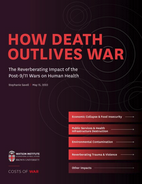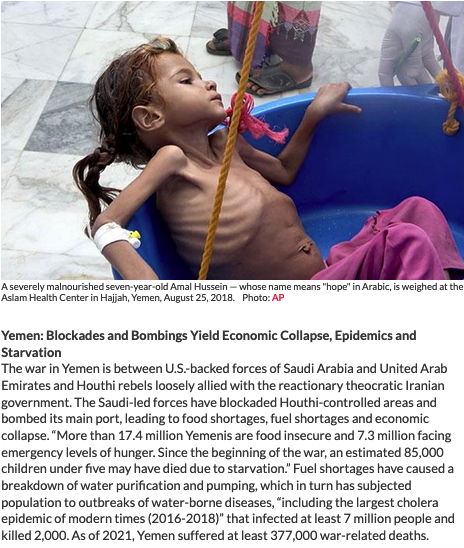Debra Sweet | May, 26, 2023
 This week, we had planned to share a look at the U.S. drone war — it’s aftermath and ongoing and growing carnage as the use of weaponized drones spreads. Look for that next week.
This week, we had planned to share a look at the U.S. drone war — it’s aftermath and ongoing and growing carnage as the use of weaponized drones spreads. Look for that next week.
Warning: there’s an assignment here, should you choose to accept it.
On May 15, a study was released that should have made huge headlines, but didn’t. Thanks to Lyle Rubin, classroom presenter with WeAreNotYourSoldiers.org, who first called our attention to the recent Brown University study by Stephanie Savell of its Watson Institute — How Death Outlives War: The Reverberating Impact of Post-9/11 Wars on Human Health.
And thanks to RevCom.us which presents, this week, an important introduction to the U.S. global war on terror — New Study Reveals Massive Hidden Toll of “Indirect” Casualties of War: America’s Post-9/11 Wars: The “Gift” That Keeps on Killing. The piece brings the study to life with a pictorial of the key findings, country by country, saying the study has “opened a window on a level of American crime which has been largely hidden until now.” From the summary: A “spiraling pattern of war-induced poverty, food insecurity, communicable diseases, and death…”
As terrible as the “direct” death toll is, the new Watson Institute report brings to light that the actual toll of death and misery from these wars is vastly greater than those killed by bombs and bullets. It describes a “spiraling pattern of war-induced poverty, food insecurity, communicable diseases, and death [that] is repeated across the war zones.”
Here we can only sketch evidence and conclusions of the Watson Center report, but we encourage people to read this carefully researched and reasoned report to get the full picture.
- The destruction of civilian infrastructure—electrical grids, water purification plants, hospitals—leads to the spread of epidemic diseases like cholera and diphtheria and the collapse of healthcare systems to treat them and vaccination programs to prevent them. Doctors flee the country, making healthcare even more inaccessible. In the five years after the 2003 U.S. invasion of Iraq, 18,000 doctors—half the country’s total—fled.
- The bombing of cities causes massive job losses and intensifies poverty. The bombing of rural areas devastates farmlands with craters and toxic chemicals. The bombing of ports and electrical stations, along with the deaths of civilian breadwinners, gives rise to economic collapse, poverty and starvation that kill hundreds of thousands, mainly children. In Somalia alone, the report says, “At least 258,000 people, including 133,000 children under five, died between October 2010 and April 2012.” Starvation also stalks millions in Yemen and Afghanistan.
- The use of depleted uranium, white phosphorus, dioxin and other toxic chemicals by the U.S.—and their “disposal” in open-air burn pits—poisons the air and water and leads to increases in cancer, birth defects, and infant and maternal mortality. Citing a UN estimate, the Watson Center report says that “2,000 tons of depleted uranium may have been used in [Iraq]. Sandstorms occur often, blowing radioactive particles from military dump sites into residential neighborhoods.”
- The extreme stress of being “under fire” for years or decades, seeing loved ones blown to pieces, living on the edge of starvation, also translates into increased mental illness, drug addiction, and interpersonal violence, especially against women. “In Iraq, rape and sexual violence increased sharply after 2003; one in five Iraqi women has suffered physical or psychological abuse since then.”
Below is one example of the photographs in the pictorial summary (country by country) of the study:

So the question is, when you know the scope and depth of this American crime — what should be done in response? I do want to hear your thoughts — both readers who regularly write, and you who don’t but have insights/questions/suggestions. I’m not asking for essays, just thoughts, however they are organized, or not.
Carol Dudek is in touch, when the internet allows, with a friend living through the civil war in Sudan. 1.3 million people have fled Sudan, one of the largest and poorest countries on the content of Africa in the last 6 weeks. Check Sudan’s Struggle for Carol’s reports.
